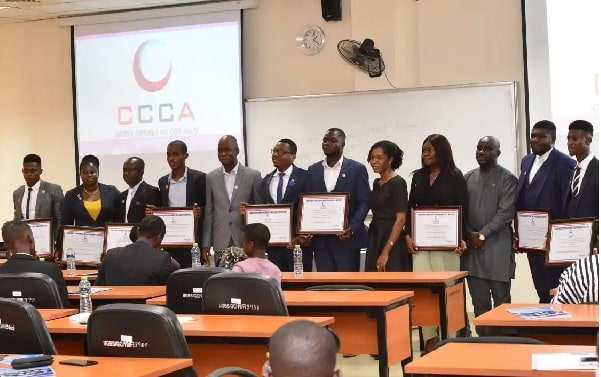Cybercrime to Increase Global Damages by 2025

The World Economic Forum says that cybercrime cost the world $6 trillion in 2021 and is expected to cost $10 trillion annually by 2025.
Dr. Vera Akafo Ayitey, a lecturer at the Department of Management Sciences and School of Business at the University of Education, Winneba, said that the number of cyberattacks kept increasing by the year, which required more security measures.
Dr Ayitey was speaking last Saturday at the graduation ceremony of the Chartered Compliance and Cyber Analyst (CCCA) Institute held at the University of Ghana Business School Graduate Campus at Legon.
She was speaking on the topic: “Organisational Culture and Fraud Prevention” where she said that it was crucial for organisations to focus on building a cyber-secure culture both at the management and employee levels.
READ ALSO: How to buy 2023 WASSCE results Checker via Momo and online
“In Ghana we can talk about data breaches at ECG and the University of Ghana where peoples’ scholastic financial results were all over the place online. So the question is what happened? Was it systemic failure or human error? She queried.
“There are things that we do privately or things that are confidential which should not come out, but through cybercrime, sometimes we hear of such confidential issues. Someone somewhere may be keeping tabs on what we are doing. So issues of confidentiality can be breached,” she said.
The Organisational culture
She reeked leadership role in institutions to ensure that the organisational culture was resilient to cyberattacks by adhering to cybersecurity protocols using specific strategies to implement cyber-security culture.
“One of the Outcomes of cybercrime is obviously financial losses. Cybercrimes also damage the reputation of a company because organisations have assets including intangible assets which is reputation, which takes so long to build, but it is so easy for us to lose so when an organisation is attacked, it affects their reputation as people lose confidence in them,” she said.
“Some researchers have mentioned that one of the reasons why Hillary Clinton could not become the presidential candidate of the democrats was because of her association with leakage of confidential information. So reputation is very important to stakeholders – from customers to suppliers and clients and even the natural environment,” she added.
Other challenges are also present
Dr Ayitey, who is also a life coach and public speaker, mentioned operational disruption as well as regulatory and legal issues as some of the other consequences which accrue from cybercrime and urged organisations to adhere to cyber-security protocols.
“Once it becomes known that an organisation has suffered from cyberattack, the lenses of the regulator will be drawn to that organisation and where it is realized that it was due to flaws in the organisation’s technology or human flaws, then beside remedying the situation you would also have to pay certain finds,” she said.
“The fight against cybercrime has moved beyond the IT department to include people, processes and culture, so we need to work with the IT department to ensure that our culture is resilient,” she advised.
Graduation from schools
Four students who have successfully completed the 14 requisite papers were awarded certificates at the graduation ceremony last Saturday.
They were Lance Corporal Apoore Jude Azur of the Ghana Armed Forces Command and Staff College, Mark Gyan of the Bank of Ghana, Sydney Kwakye also of the Bank of Ghana and Oppong Daniel, formerly of Legacy Capital.
Director of the CCCA Institute, Dr Theophilus Kwadjo Odjer-Bio who chaired the event conferred the awards on the graduands.

 Nigeria Slaps $220 Million Fine on Meta for Antitrust, Data Protection Violations
Nigeria Slaps $220 Million Fine on Meta for Antitrust, Data Protection Violations  How to Make Your Android Phone’s battery Last Longer
How to Make Your Android Phone’s battery Last Longer  Spotify Is Now a Social Media Platform
Spotify Is Now a Social Media Platform  What Does CC and BCC Mean in Email?
What Does CC and BCC Mean in Email?  How to Use Google Lens on the iPhone
How to Use Google Lens on the iPhone  Bawumia’s smartphone pledge misguided and visionless – Adongo
Bawumia’s smartphone pledge misguided and visionless – Adongo  Good Grow: The Marijuana Farm Founded by Akufo-Addo’s Daughters
Good Grow: The Marijuana Farm Founded by Akufo-Addo’s Daughters  National Food Suppliers for Free SHS set to picket at Education Ministry
National Food Suppliers for Free SHS set to picket at Education Ministry  Information Ministry justifies ¢151k paid to staff as Covid-19 risk allowance
Information Ministry justifies ¢151k paid to staff as Covid-19 risk allowance